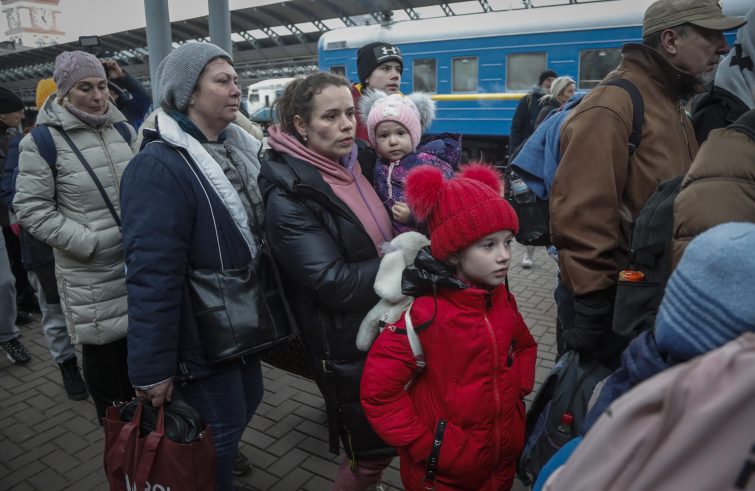
The incumbent Apostolic Nuncio to the United Kingdom, with headquarters in London, Msgr. Claudio Gugerotti, originally from the Italian city of Verona, was based in Kiev until 2020, following his appointment as nuncio to Ukraine. He is now in constant telephone contact with his many acquaintances still in the country, whose lives are at risk today because in Kiev – and in most of Ukraine – people are being killed. Russian tanks have rolled in, amidst horrendous violence, and the capital has not yet capitulated only because the Russians are still a short distance away. “I spend the whole day on the phone. I’m constantly in touch with those who are still there, to enquire about their situation, to know if they are alive…”, he says, his voice cracking with emotion.
What have your acquaintances told you?
That the situation is overwhelming, everyone is resisting, even with their bare hands….
Shelling, people fleeing to shelters, seeking safety in the West or in Europe: it’s a desperate situation.
Is there a window of opportunity?
Alas, so far there is none. It requires a special intervention of the Holy Spirit and the faith to embrace it. The declared intention is to seize all of Ukraine.
What can be done?
The question is: apart from the Pope’s loud and clear voice (and the Holy See’s constant and silent diplomatic activity), which international powers have the strength and authoritativeness to convene a serious round of negotiations, or simply have the will to do so?
At this point it is a head-on clash, and by no means primarily between Russians and Ukrainians, but between an oriental region and western culture.
This has already happened many times in the past.
You know the people of Ukraine. What are their distinctive qualities?
They are good, generous, hard-working people. At the same time, they are a proud people, deeply attached to their homeland.
Even if there were a full occupation of the country, there would be a risk of becoming a second Afghanistan, marked by constant partisan guerrilla resistance. If somebody thought they would be welcomed with open arms, they were wrong – it will never happen.
What now?
Just as we could never have imagined this would happen, we have no idea how it will develop. Do they intend to bring down only the Ukrainian government? Annex these and other territories? Reach Transnistria cutting off Ukraine from the Black Sea? Occupy Moldova? And I don’t need to add to that…
We Westerners are responding with strong economic sanctions….
The sanctions will affect everyone, but the weakest, the poorest, will pay the brunt.
I have never seen the rich suffering from the consequences of sanctions.
They are either unscathed or, on the contrary, as I have witnessed, they have often profited at the expense of the weakest. Money is very versatile in terms of its capacity to open up new channels. The present situation is largely due to the Ukrainians’ rapprochement with the West. We therefore have a very specific responsibility.
You have also served as apostolic nuncio to Belarus, whose people have also been experiencing difficulties.
Silent, humble, peaceful people. They have always had to accept conditions they didn’t want.
How are Catholics in Ukraine holding up?
There are approximately four million Greek-rite Catholics in Ukraine. They are also targeted by Russian violence because they strongly defend national identity. And then there are about one million Latin-rite Catholics, some of them of Polish origin. We must help them, support them.
There will be millions of displaced persons. Even the British government has overcome its reluctance to accept refugees, which is a good sign. The new apostolic nuncio in Kiev, Monsignor Visvaldas Kulbokas, is doing an extraordinary job and is a solid and reliable point of reference.
You previously experienced the ” low intensity” war in Ukraine, in the Donbas.
In reality, it was a horrific war, little is known about it in the West. When I was there, I saw people emerging from shelters, cellars and basements bursting into tears, desperate, devastated by the misery and the curfew, with Catholics comforted only by the fact that the Pope had not forgotten about them.
What can we do?
Pray, give help. And have faith. Faith moves mountains – and if they do not move, it’s because we don’t have enough faith. Believe me. And we must also devote time to in-depth reflection and overcome our shallow approach that takes everything for granted.
Without lofty and global ideals, without wisdom, relying solely on our instincts, disasters can happen at any time.











